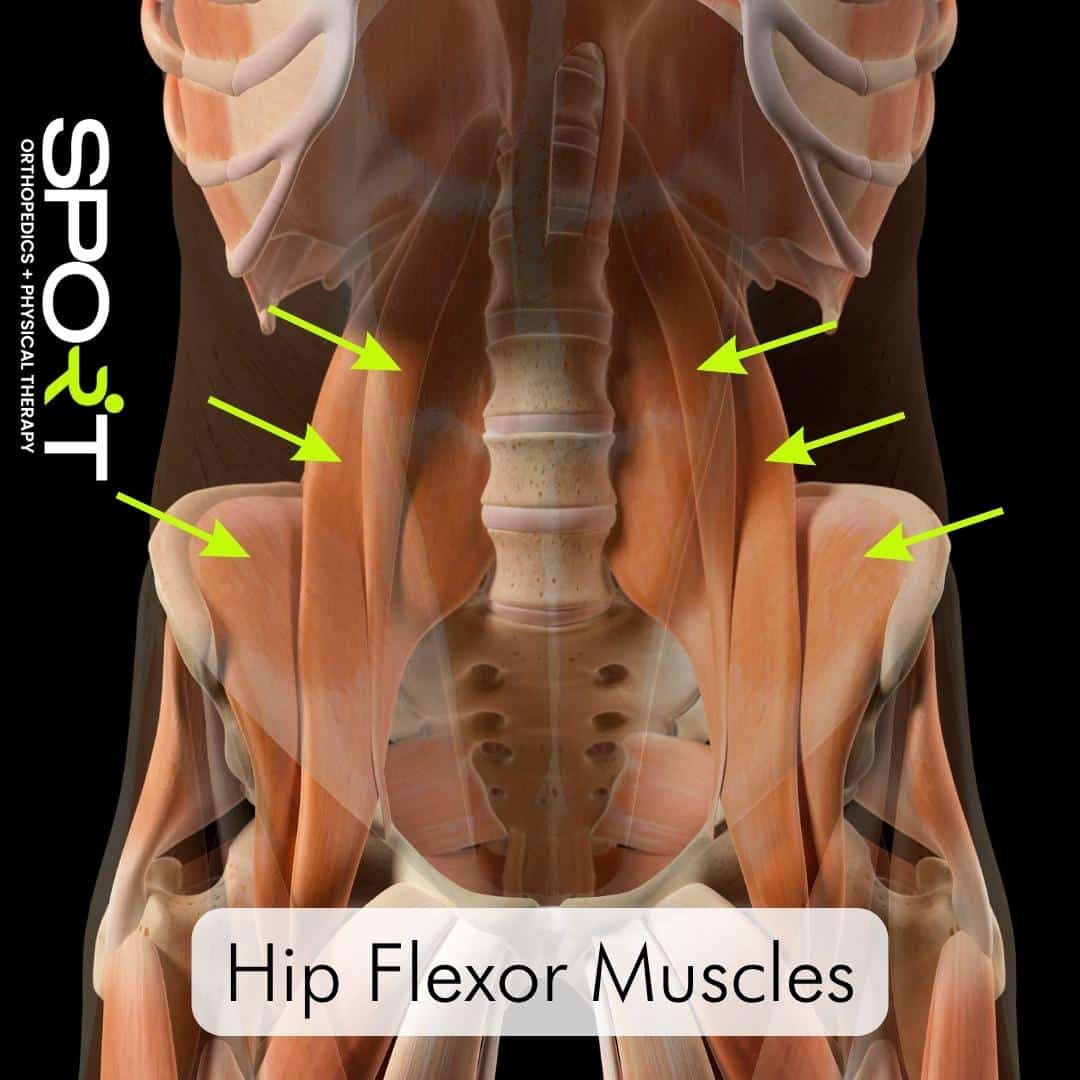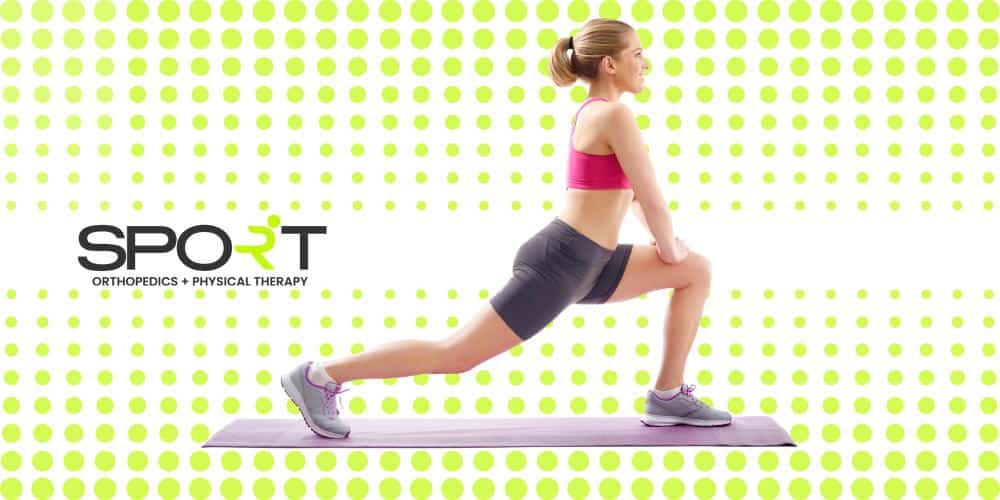Hip Flexor Strain Treatment in Dallas, Frisco, Prosper, and Wylie, TX
Home » Conditions » Hip Flexor Strain Treatment in Dallas, Frisco, Prosper, and Wylie, TX
Hip Flexor Pain Treatment
At SPORT, we will identify the source of your pain and then utilize state-of-the-art therapeutic techniques that focus on restoring your range of motion with top-of-the-line hip flexor strain treatment in Dallas. We employ some of the best orthopedic surgeons in Dallas, so you can rest assured that you’re in good hands. Call 469-200-2832 to schedule an appointment with us. Our specialists treat a number of hip-related injuries and conditions, including arthritis, hip pointers, and much more.
What Is a Hip Flexor?
Lifting your knee up toward your body takes work. The muscles that make this movement possible are your hip flexors. These muscles and their tendons, like all the others, can experience strain if you overwork them.
Your hip flexor muscles allow you to bring your knees and thighs toward your body, as well as to bend at the waist. Any symptoms of strain with these muscles can impact your comfort or mobility. It is important to rest and seek treatment for your symptoms, or they will worsen.
Where Is Your Hip Flexor?
Your hip flexors are groups of muscles located in the front of your hip region. A hip flexor includes the iliopsoas muscle, which consists of the psoas major and iliacus muscles. These muscles are responsible for flexing the hip joint, bringing your thigh towards your torso. They are important for activities like walking, running, and lifting your legs.
Hip Flexor Anatomy
The anatomy of the hip flexor primarily involves the iliopsoas group, which is the strongest set of muscles in the hip flexor region. The iliopsoas is composed of two muscles: the psoas major, which originates from the lumbar spine, and the iliacus, which starts from the iliac fossa of the pelvis.
Both muscles converge to insert onto the lesser trochanter of the femur (thighbone). Additionally, other muscles, such as the rectus femoris (part of the quadriceps) and sartorius, also contribute to hip flexion. These muscles work together to flex the hip, allowing for movements such as lifting the knee towards the body. Hip flexor muscles also help to balance your posterior pelvic muscles.
Hip Flexor Muscles
The hip muscles that form the hip flexors are the iliopsoas group, which consists of the psoas major and iliacus muscles. These muscles work together to flex the hip joint and move the thigh up toward the torso. They play a crucial role in walking, running, and maintaining posture.

What Is a Hip Flexor Strain?
A hip flexor strain is a stretching or tearing injury to one or more of the muscles responsible for flexing the hip joint. Hip flexor strains are common orthopedic conditions. They limit mobility and affect people in different ways, depending on their activity level and type.
What Causes a Hip Flexor Strain?
A hip flexor strain occurs from the overuse or overstretching of the iliacus and psoas major muscles, as well as the rectus femoris muscles. The actual injury occurs when the hip flexor muscles and tendons stretch or tear. More active individuals are at higher risk for this condition, especially if they engage in any of the following activities:
- Dancing
- Cycling
- Football
- Martial arts
- Soccer
Other specific factors that can cause a hip flexor strain include sudden movements, overuse, poor flexibility and strength, improper warm-ups, previous injuries, and posture and biomechanical issues.
Hip Flexor Pain When Walking
Sometimes, hip flexor pain when walking can occur due to hip flexor muscle tension, weak muscles, tendinitis, bursitis, muscle fatigue, and other issues.
Types of Hip Flexor Strains
Hip flexor strains range from very mild to very severe. There are three grades of hip flexor strains, which we sort based on the severity of the injury.
Grade 1 Hip Flexor Strain
Grade 1 hip flexor strains involve minor tears or stretching of the hip flexor muscles, resulting in mild pain and discomfort, but maintaining most of the function. Individuals can usually continue their activities with minimal limitations.
Grade 2 Hip Flexor Strain
Grade 2 hip flexor strains are characterized by more significant tearing of the muscle fibers, leading to moderate pain, swelling, and bruising, as well as a decreased range of motion and strength in the hip. Walking and other activities may be noticeably affected.
Grade 3 Hip Flexor Strain
Grade 3 hip flexor strains represent the most severe form, with a complete tear of the muscle, causing severe pain, significant swelling, and bruising, and making walking or even standing extremely difficult. This level of strain often requires a lengthy recovery period, possibly including surgery and physical therapy, to regain full function.
Where Is Hip Flexor Pain Felt?
Hip flexor pain is typically felt in the front part of the hip or groin area. This pain can manifest as a sharp, sudden discomfort when the muscles are strained or as a persistent, dull ache in cases of overuse or inflammation. The intensity and specific location of the pain may vary depending on whether the condition is a hip flexor strain or a hip flexor tear.
What Does a Hip Flexor Strain Feel Like?
The most recognizable symptom is pain located at the front of the hip, where it meets the thigh. Below, we list other symptoms that signal a possible hip flexor strain.
Hip Flexor Strain Symptoms
- Sudden, sharp pain in the hips or pelvis
- Tenderness or soreness in the upper leg
- Stiffness after being stationary
- Bruising or swelling of the hips or thighs
- Muscle spasms at the hips or thighs
- Pain while stretching hip or thigh muscles
Many of these injuries occur during sports games or practice, but they also result from poor posture or arthritis. Our orthopedic specialists will identify the cause of your symptoms and form an individualized treatment plan to help get your life back after an injury.
Torn Hip Flexor Symptoms
Hip flexor tears have several notable symptoms, including the following.
- Sudden, severe pain
- Swelling and bruising
- Weakness and difficulty moving the leg
- Tenderness to the touch
- Limited range of motion
- Popping or snapping sensation
How to Diagnose Hip Flexor Pain
To diagnose a torn or strained hip flexor, we typically begin by taking the patient’s medical history, and then performing a physical examination. We may order imaging studies, such as X-rays, ultrasounds, or MRIs, to confirm the diagnosis and assess the extent of the injury.
Hip Flexor Strain Test
One common sports medicine test used to assess for a hip flexor strain is the Thomas test. During this test, the individual lies on their back on an examination table, and one leg is bent and pulled towards the chest while the other leg hangs off the table. This maneuver stretches the hip flexor muscles, and pain or limited range of motion may indicate a strain.
What Are Hip Flexor Strain Treatments?
The number one treatment for a hip flexor strain is rest. Resting the affected muscles is essential to their recovery. Avoid further stretching of the muscles, and switch up your normal routine. Instead of riding a bike, consider a gentler activity such as swimming.
Milder hip flexor strains can be treated from the comfort of your own home, with no prescriptions or surgeries. Cloth-covered ice packs, heating pads, over-the-counter pain relievers, and rest are all viable options for at-home treatment.
For more severe cases, we might recommend Dallas physical therapy. On very rare occasions, surgery may be required to repair the muscles.

How Long Does a Hip Flexor Strain Take to Heal?
Recovery depends mostly on the severity of the injury, and partially on how much rest you give your muscles. Recovery time ranges from a few weeks for mild strains to over six weeks for severe strains. Failure to rest your muscles will result in lengthened recovery times and a worsened injury.
Hip Flexor Strain Recovery Time
The recovery time for a hip flexor strain or tear depends on how badly injured the muscle is. Most will heal on their own within one to three weeks. However, more severe injuries may require more recovery time and more extensive treatment. We outline the general recovery timelines for each grade in the following sections.
Grade 1 Hip Flexor Strain Recovery Time
Grade 1 hip flexor strains usually involve a mild strain or tear of the muscle fibers. Recovery time is relatively quick. With rest, ice, and gentle stretching exercises, patients can expect to return to normal activities within 1 to 3 weeks.
Grade 2 Hip Flexor Strain Recovery Time
Grade 2 hip flexor strains involve more significant tearing of the muscle fibers, therefore requiring a longer recovery time. A grade 2 strained hip flexor may need anywhere from 4 to 8 weeks to fully heal.
Grade 3 Hip Flexor Strain Recovery Time
A grade 3 hip flexor strain is the most severe strain the muscle can suffer. It is often a complete or near-complete tear of the muscle. Recovery from a grade 3 strain can take several months, often requiring 8 to 12 weeks or more for the muscle to heal fully.
How Do I Prevent Hip Flexor Strains?
Gentle stretching a few minutes before workouts or vigorous exercise helps to reduce the likelihood of a hip flexor strain. Warming up your muscles with a short walk also helps. In short, don’t push your hip flexors too hard. Listen to your body, and contact our orthopedic specialists for any questions you may have regarding your hip flexor strain.
Hip Flexor Exercises
There are a few exercises that can help prevent future hip flexor strains. Incorporating a combination of strengthening exercises and stretches can help improve the flexibility, stability, and strength of the hip flexor muscles. This can also help correct any muscle imbalances. A SPORT physical therapist can help you perform these exercises and stretches to ensure you have proper form.
Hip Flexor Strengthening Exercises
- Hip Flexor Marches: Begin by lying on your back with your knees bent and feet flat on the floor. Slowly lift one knee towards your chest while keeping the other foot planted on the ground. Alternate legs in a marching motion, focusing on engaging the hip flexor muscles to lift the knee.
- Hip Flexor Bridge: Lie on your back with your knees bent and feet flat on the floor, hip-width apart. Lift your hips towards the ceiling, squeezing your glutes and engaging your core. Hold this position for a few seconds, then lower your hips back down. Repeat for several repetitions.
- Leg Raises: Lie on your back with your legs straight. Slowly lift one leg off the ground, keeping it straight, until it’s perpendicular to the floor. Lower it back down with control and repeat on the other side. Focus on engaging the hip flexor muscles to lift the leg.
Best Hip Flexor Stretches
- Kneeling Hip Flexor Stretch: Begin in a kneeling position, with one foot in front and the other knee on the ground. Shift your weight forward, keeping your back straight, until you feel a stretch in the front of the hip of the back leg. Hold this position for 20-30 seconds, then switch sides.
- Standing Hip Flexor Stretch: Stand upright with one foot in front of the other in a lunge position. Lower your hips towards the ground, keeping your back straight, until you feel a stretch in the front of the hip of the back leg. Hold this position for 20-30 seconds, then switch sides.
- Supine Hip Flexor Stretch: Lie on your back with both knees bent and feet flat on the floor. Bring one knee towards your chest, then gently lower it across your body towards the opposite side, using your hand to guide the stretch. You should feel a stretch in the front of the hip of the extended leg. Hold for 20-30 seconds, then switch sides.
Contact SPORT Orthopedics + Physical Therapy for Hip Flexor Pain Treatment in Dallas
At SPORT Orthopedics + Physical Therapy in Dallas, we understand the debilitating effects of hip flexor pain and are dedicated to providing comprehensive care to help you overcome it. Our team of experienced orthopedic specialists and physical therapists offers personalized treatment plans tailored to your specific needs. We combine innovative techniques and evidence-based practices to alleviate pain, restore function, and prevent future injuries.
Whether you’re seeking conservative treatments like physical therapy and rehabilitative exercises or advanced interventions such as minimally invasive procedures, you can trust our expertise and commitment to excellence. Contact us today to schedule an appointment and take the first step towards a pain-free life.


